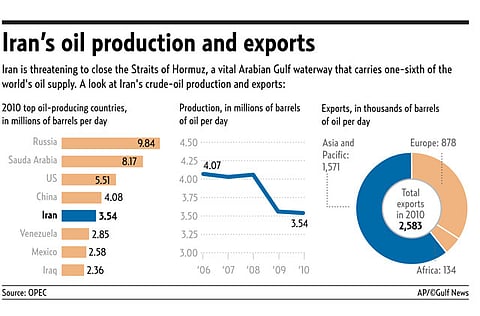Tehran flaunts bargaining chip
Iran flexes its muscles, fully aware of global implications of closing the Strait of Hormuz

Abu Dhabi: Iran's war games in the Gulf are nothing more than a tactical move to strengthen its position ahead of future talks with the West to get the looming sanctions threatening its oil exports lifted, according to energy experts.
As matters stand, Iran is trying to show the western nations that if the Islamic Republic is attacked or its oil exports are curbed by sanctions it could close the strategic Strait of Hormuz, through which one sixth of the world's oil flows.
"Closing the Strait of Hormuz by Iran would in effect start a war," Samuel Ciszuk, Consultant at London-based KBC Process Technology Ltd, told Gulf News. "The Iranians themselves don't want a war. They want to mitigate the appetite for future sanctions," he added.
"I believe there are a lot of good military reasons why Iran would not be able to close Hormuz for more than a few weeks, due to US/GCC (Gulf Cooperation Council) counter-measures. Also, this would only be an act of desperation for Iran as it would be cutting off its own oil exports too," Robin Mills, Head of Consulting at Manaar Energy in Dubai, told Gulf News.
"More likely would be a lower-level campaign of harassing ships, small-scale attacks etc, sabotage, attacking vulnerable oil infrastructure in the Gulf and seeking to hamper Iraqi oil exports. If Iran's own exports were cut off entirely, I estimate prices could go up to $150 (Dh550.50) a barrel, depending on whether Saudi Arabia made up the gap, if Western countries used their strategic stocks, and whether the market panicked," Mills added.
He said there will always be buyers for Iranian oil with China, India, Turkey, Japan and South Korea all signalling their willingness to keep buying.
"[The] question is whether Iran gets pushed into offering significant discounts to get sales," said Mills.
Yesterday, the US and the European Union stepped up pressure on Iran with European diplomats agreeing in principle to ban Iranian oil imports and Washington sending its Treasury Secretary to Asia to discuss new sanctions.
EU diplomats said the European Union governments reached a preliminary agreement to ban imports of Iranian crude but had yet to decide when such an embargo would be put in place.
US Treasury Secretary Timothy Geithner will travel to China and Japan this week for meetings with senior government officials in both countries, and will offer ideas to place increased pressure on Iran, the Treasury Department said on Wednesday.
The US and other Western nations have imposed sanctions on Iran's economy over Tehran's controversial nuclear programme, which they believe is being used to develop nuclear weapons.
Iran has repeatedly denied that allegation, saying the programme is purely for energy and medical uses.
"Iran may also be playing to a hardline domestic audience. An Iranian-led attack would make them lose any moral high ground. Despite escalating tensions, I see oil prices lower than $120 per barrel, near-term," said Ciszuk.
Sign up for the Daily Briefing
Get the latest news and updates straight to your inbox



